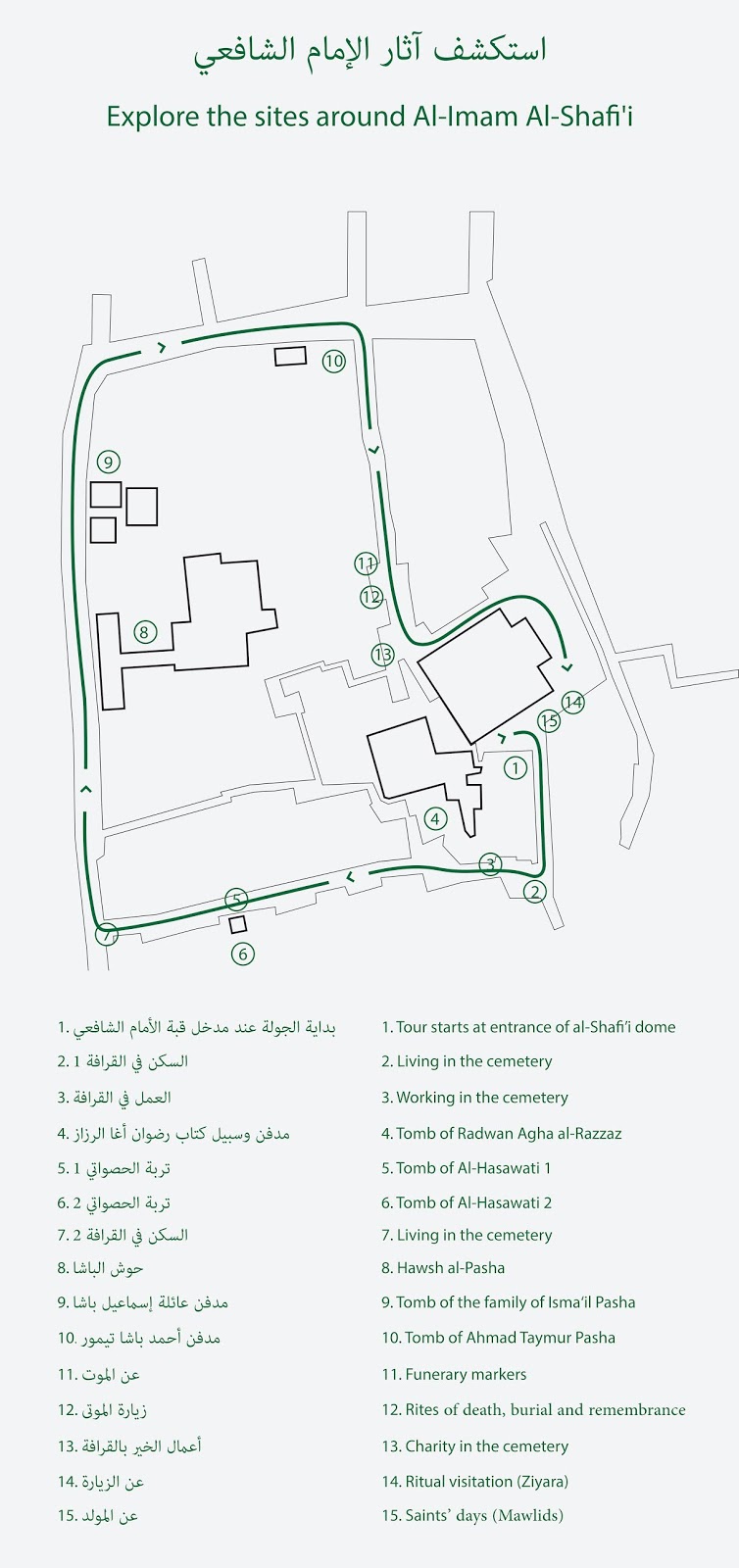العمل في القرافة / Working in the cemetery
طبيعة القرافة الخاصة وتنوع النشاطات بها نتج عنها توفر فرص عمل لفئات معينة. فإلى جانب الوظائف المتوقعة كالتربية وحفاري القبور وناحتي الشواهد وفرت أوقاف المباني الدينية والتعليمية وظائف للعامة وأخرى للمتعلمين
فقد عمل العامة في الحراسة والنظافة والوقادة والتزميل أما المتعلمون فعملوا كشيوخ ومدرسين بالمدارس والخانقاوات والكتاتيب وفي تلاوة القرآن والأوراد، وجاء طلاب العلم لدراسة الفقه والحديث بالمدارس والعلوم الباطنية بالخانقاوات وحصل بعضهم على إعانات للمعيشة. أما الأيتام فأتاحت لهم الكتاتيب فرصة لتعلم القرآن واكتساب مهنة في المستقبل. كما سكنت الأسر الفقيرة بالقرافة للاستفادة من الخيرات التي تتيحها الأوقاف والنفحات التي يوزعها الزوار، وبالتالي لم تكن القرافة مكانا للموت ومأوى للفقراء والمساكين فحسب بل كانت موطنًا لعائلات الطبقات الوسطى واشتهر لقب (القرافي) كلقب عدد من عائلات العلماء القاطنين بالقرافة.
أرباب الوظائف المشار اليهم بالوقفيات
الوظائف الدينية المرتبطة بالصلاة وتلاوة القرآن والحديث والتعليم.
الوظائف الإدارية وأهمها ناظر الوقف ويعمل معه الكاتب والمستوفي وشاد الأعمال.
الوظائف الخدمية مثل الخادم والفراش والوقاد.
الوظائف المهنية مثل البنا والنجار (فقط في حالة المنشآت الكبيرة)
الوظائف الإدارية وأهمها ناظر الوقف ويعمل معه الكاتب والمستوفي وشاد الأعمال.
الوظائف الخدمية مثل الخادم والفراش والوقاد.
الوظائف المهنية مثل البنا والنجار (فقط في حالة المنشآت الكبيرة)

للدخول الي اللعبة أضغط هنا

للدخول الي اللعبة أضغط هنا
The cemetery’s multi-functional nature has meant that certain professions have always found jobs here. Besides the obvious jobs for caretakers, gravediggers and tombstone carvers, the endowments of the religious establishments made provision for both menial and specialized jobs. Non-educated employees worked as guards, cleaners, lamplighters and sabil functionaries while the educated were sheikhs of religious colleges and sufi hospices, reciters of Quran and religious poetry and teachers of religious subjects. Students who came for esoteric studies in the Sufi establishments and exoteric studies in the religious colleges were also given an allowance. Young orphans were given a chance to learn a vocation in the kuttabs and many poor families resided there to benefit from the charity paid out regularly from these endowments. As a result, the cemeteries were not just a death or even a place of residence for the poor and the eccentric, they were where many middle-class families settled. In fact, al-Qarafi (from al-Qarafa) was a well-known name for ‘ulama families
The categories of jobs in an endowment for a religious establishment
Religious, such as those with duties related to prayer (salah), Quran recital, sayings of the Prophet (hadith), and teaching;
Administrative and financial, as headed by the endowment overseer or ná~ir. This category may include positions such as kátib (scribe), mustawfí (financial controller) and shádd al-a`mál (builder)
Services, such as khádim (general keeper), farrásh (cleaner and handyman), waqqád (in charge of the lights)
Professionals (especially in large establishments) that provide specific services such as a master builder, a carpenter, etc.
 |
Click Here To Play |
